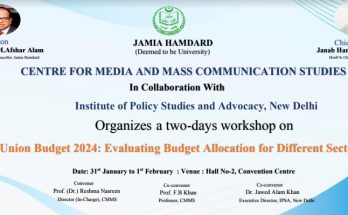A REPORT ON
One Day Workshop on
Development Policies and Budgets for Disadvantaged Communities
9 AM – 3 PM, 25 December 2017
Mushawarat Hall, D-250, Abul Fazal Enclave Jamia Nagar, New Delhi-25
Conducted by- Mr. Jawed Aam Khan, an expert on budget studies and founder of IPSA
Participants and Organizers: Institute of policy studies and advocacy (IPSA) has taken initiative for conducting the workshop on budget analysis for disadvantaged communities. The participants of the workshop was Student, NGOs, Activists and Professionals of different multinational corporations.
Introduction
Budgets are the government’s most powerful tool to meet the needs of its people, especially those who are poor and marginalized. But in too many countries, budgetary decisions are made behind closed doors with little or no regard for the engaging public and consider their interest. The results are poor policy choices and squandering of scarce public resources
Objectives of Workshop:
- Budgets analysis at national, state, local levels and transparency of policies, budgets and advocacy especially for marginalized and deprived sections.
- Provide information to different communities for understanding the budget in simple way and safeguarding the interest of the people of the nation.
- To check the bottleneck in implementation of different government schemes and policies at ground levels and protect the rights of disadvantaged communities.
Agenda of Workshop: The Workshop consists of three sessions as listed below:
Session 1: ( 9 AM – 11 AM) Basic concept and terminologies related to budgets and policy in India: Budget making processes and institutions of central ,state and local government.
Session 2 : (11:30 AM – 1:00 PM ) Policy and Budgets for Dalit and Adivasis and Policy and Budgets for Muslims.
Session 3 : ( 1:30 PM – 3: 00 PM ) Questions and Answers are completed for participants.
Topic: workshop on Development Policies and Budgets for Disadvantaged Communities
Conclusions:
The workshop was successful for conveying the information related to budget and different types of schemes for the participants. Participants also got benefit from the discussion of the groups under the guidance of experts. Questions and answers session are done.
Consultation on Policy Asks for Minorities in Budget 2017-18
Mushawarat Hall, D-250, Abul Fazal Enclave Jamia Nagar, New Delhi-25
The Consultation was jointly organized by Institute of Policy Studies and Advocacy (IPSA) and All India Muslim Majlis-e- Mushawarat (AIMMM).
Moderations: Abdul Rashid Agwan
Presentation of Policy Ask: Jawed Alam Khan
Panelists: Sayeeda Hamid, former member Planning Commission, Siraj Hussain , former Secretary Movement of India ,Navaid Hamid ,President AIMMM
Topic: Consultation on Budget 2018-19 and Expectation from Minorities
Key Points of Discussion
- Increase in Budget Allocation and Implementation of Prime Minister New 15 Point Programme (15 PP) for Welfare of Minorities
- The guidelines of Centrally Sponsored Schemes (CSS) covered under 15 PP should allow for customized intervention by identifying and filling up the development gaps in minority dominated localities.
- Minorities have not been included in budgetary process of either the Union or the State government by opening a minor head in detailed budget book and introducing a budget statement on minority related programmes. The government should include minorities in the budgetary processes based on the strategy of implementation of SCSP and TSP.
- MSDP guideline should be revised to focus on undertaking initiatives that are need based instead of topping up approach adopted in existing CSS covered under 15 PP. MSDP should emphasise Plans to overcome local development deficit instead of aiming to saturate the coverage of already existing national programme. Secondary and senior secondary schools need to be made functional already constructed under MSDP in many MCDs or Minority Concentrated Blocks. Further, there is a need for establishment of degree colleges and construction of women hostel in MCDs for promoting higher education among minority community.
- The unit cost of scholarship has to be revised. There is a strong case for increasing allocation for Pre – Matric Scholarship including other scholarships (Post Matric, Merit cum means, free coaching) from the existing level. Currently, Rs.1000 per annum under Pre – Matric Scholarship is allocated for each student of the minority community (Day Scholar) which is insufficient, especially if we take into account the rate of inflation
- Large numbers of students are deprived of scholarships due to technical glitches at the State level and many minority run institutions are not able to register on line scholarship web portal. There is lack of coordination between bank and district administration in terms of opening bank account of students, hence delays in scholarships happened. Also, the application procedures need to be streamlined.
- Muslim community should try to grab the benefits frin general sector progrmme in minority specific programmes
- There is need to engage government with regard to problems faced by the minority community
- To conduct more research studies ,impact evaluation and awareness about development programmes







